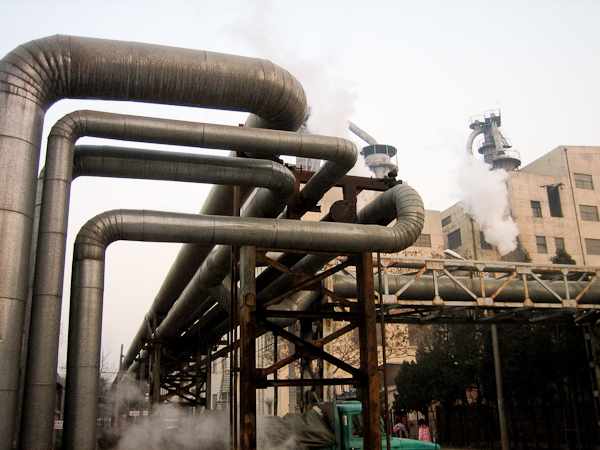Picture Factory

Magda wrote to say that she's finally gotten a new computer, an updated copy of Lightroom, and a new lease on her photo life. I'm thrilled that she's thrilled, and can't wait to see the pictures. But what moves me to mention it is her reminder of some advice I gave last term: to take a class on the view camera.
I try to help folks figure out what's next on their individual journey toward becoming more of the photographer they already are. In Magda's case it appeared that she was using her dSLR as if it wanted to be a slower, more ponderous machine. So I suggested she explore the view camera. With its bellows and tilt-swing focus plane, single sheet film loader, manual shutter, tripod, cable release, various other paraphernalia, I can imagine that the ground glass magic of a 4x5 would activate a useful cascade for her. For all of us, learning to operate the gears and knobs of a large format camera opens the factory doors to reveal the engine that makes photographs from the image inside the camera obscurra. And that's pretty cool.
Which, of course, connects to something I've been thinking about. This weekend we saw Sweet Land on dvd. Ali Selim's first feature is a lyrical voyage through the lives of stalwart and sympathetic hardworking farmers in the Midwest. Set primarily in the early 20th Cent., the film explores relationships to the land, the community and to memory. It's beautifully shot, gorgeous, and I recommend it highly. But there's a significant problem with it. There's a photograph at the heart of the movie, a photograph made with a view camera, and it's wrong.
The problem, in this case, is with the way the photograph is made. It's not accurate. But Selim makes something of a point about the photo by giving us several different montage sequences of the process, how it was made, when it was made, the conditions of its creation; but the mechanism is wrong, the way the picture is made isn't accurate to how a view camera operates. Yes, it's true, anachronisms and continuity mistakes occasionally set me off, so pardon my obsession with details, but in this case the error was completely gratuitous. That is, the film makers didn't have to put such emphasis on the camera process itself (it doesn't matter that much within the context of the movie as a whole) and that they did but got it so wrong seems itself to somehow be part of the point -- but the point of what?
Here's the point for me: view cameras, and indeed film-based technology in general, are on the way out of the world. There's a lot that can be said (is being said) about that, from many different perspectives, but it feels sad and silly to willfully obscure the materiality of these tools, especially while ostensibly valorizing them. Now, these filmmakers might have made mistakes in the farming technology sequences, or in the specifics of post-World War I American cultural attitudes, and if your mode of action in life is wrapped in that direction you'll cry about those, and not even see this camera anomaly. Obviously, we notice what we know. And while I know that projects made by committee can take off on uncontrollable tangents, I don't want to completely let Selim and his team off the hook. In this particular case, they could have paid more attention to the camera itself; that is, without getting bogged down in tech minutiae, an accurate portrayal of the apparatus couldn't have cost much and wouldn't have slowed down the movie.
And that, actually, is where I'm going here: slow it down. Our snappy cameras and cell phone eyes have a place in the world, but there's got to be a place for a more meditative process too. If you see this film, you'll see that it says a lot about the slow process of learning to know each other, very beautifully too. And maybe the view camera sequences will, in fact, intrigue you enough to put down Flickr and pick up a slower machine. Now that would be really cool.
In Magda's case, she's postponing that part of the journey. She said she's not ready to leave her new computer just yet, to return to the darkroom and the stink of the chemistry. I completely understand these sentiments (remember that smell? the sore feet? aching back?), but I hope it's a temporary delay. There's so much to learn about photography on the factory floor, even if it's just short visit.
The picture was taken in Beijing at 798 Arts District, the city's oldest and most famous stretch of galleries and studios, which has been and is still in the process of being converted from a giant farm of industrial factories.
Comments